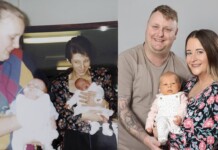A first-of-its-kind drug targeting a fused gene found in many types of cancer was effective in 93% of pediatric patients tested.
Most cancer drugs are targeted to specific organs or locations in the body. Larotrectinib is the first cancer drug to receive FDA breakthrough therapy designation for patients with a specific fusion of two genes in the cancer cell, no matter what cancer type, said researchers at UT Southwestern’s Simmons Cancer Center.
“In some cancers, a part of the TRK gene has become attached to another gene, which is called a fusion. When this occurs, it leads to the TRK gene being turned on when it’s not supposed to be and that causes the cells to grow uncontrollably. What’s unique about the drug is it is very selective; it only blocks TRK receptors,” said lead author Dr. Ted Laetsch, Assistant Professor of Pediatrics.
Larotrectinib, targets TRK fusions, which can occur in many types of cancer. While the TRK fusions occur in only a small percentage of common adult cancers, they occur frequently in some rare pediatric cancers, such as infantile fibrosarcoma, cellular congenital mesoblastic nephroma, and papillary thyroid cancer.
MORE: Australia May Become First Country to Eliminate Cervical Cancer – Rate Drops From 22% to 1%
“Every patient with a TRK fusion-positive solid tumor treated on this study had their tumor shrink. The nearly universal response rate seen with larotrectinib is unprecedented,” Dr. Laetsch said.
Among them was 13-year-old Briana Ayala of El Paso, who aspires to a career in fashion design. In 2016, Briana was found to have a rare tumor in her abdomen wrapped around her aorta, the largest artery in the body.
Surgeons in her hometown said it would be too dangerous to operate, so her family brought Briana to Children’s Health in Dallas, where surgeons had to remove portions of her aorta while removing most of the tumor.
But the cancer started to grow again and no further treatments were available.
RELATED: Lung Cancer Patient Given a Year to Live is in Remission Thanks to Cuban Vaccine
Dr. Laetsch sent her tumor for genetic testing and found that Briana’s cancer had the TRK fusion, meaning the new drug might help.
Briana enrolled in the phase 1 clinical trial of larotrectinib and began taking the drug twice a day. Within weeks, her pain and the swelling in her abdomen diminished, and scans showed her tumors had shrunk significantly.
Nearly two years later, Briana is back in school and playing with her dog, Goofy, and the family’s seven parakeets. She’s also been able to pick up her sketch pad and her dreams of a New York City fashion career.
“These are the kinds of amazing responses we’ve seen with larotrectinib,” said Dr. Laetsch, “and this is why I’m so excited about it.”
CHECK OUT: Cancer ‘Vaccine’ Eliminates 97% of Tumors With Amazing Success – Human Trials Next
The results of the larotrectinib trial in adult patients – a 75% response rate – were published last month in the New England Journal of Medicine.
The TRK-fusion mutation can be present in many types of cancers, including lung, colon, thyroid, and breast cancer, as well as certain pediatric tumors. TRK, short for tropomyosin receptor kinase, is a gene that plays a key role in brain and nervous system development and has a limited role in nervous system functions such as regulating pain in later life.
Larotrectinib belongs to a class of molecules known as kinase inhibitors, which work by cutting back on the enzymatic activity of a key cellular reaction. The selectivity of the drug means it does not cause the severe side effects associated with many traditional cancer treatments, and none of the patients with TRK fusions had to quit the study because of a drug-induced side effect.
Equally important, the response was long-lasting for most patients.
“For some of the targeted drugs in the past, many patients responded initially, but then resistance developed quickly. To date, the response to this drug seems to be durable in most patients,” said Laetsch.
A next step in the research is a clinical trial involving a similar drug for those patients who developed resistance. Dr. Laetsch will be the national leader for that clinical trial in children.
(Source: UT Southwestern Medical Center)
Click To Share The Inspiring News With Your Friends (Photo by Ranken Jordan Pediatric Bridge Hospital)




















